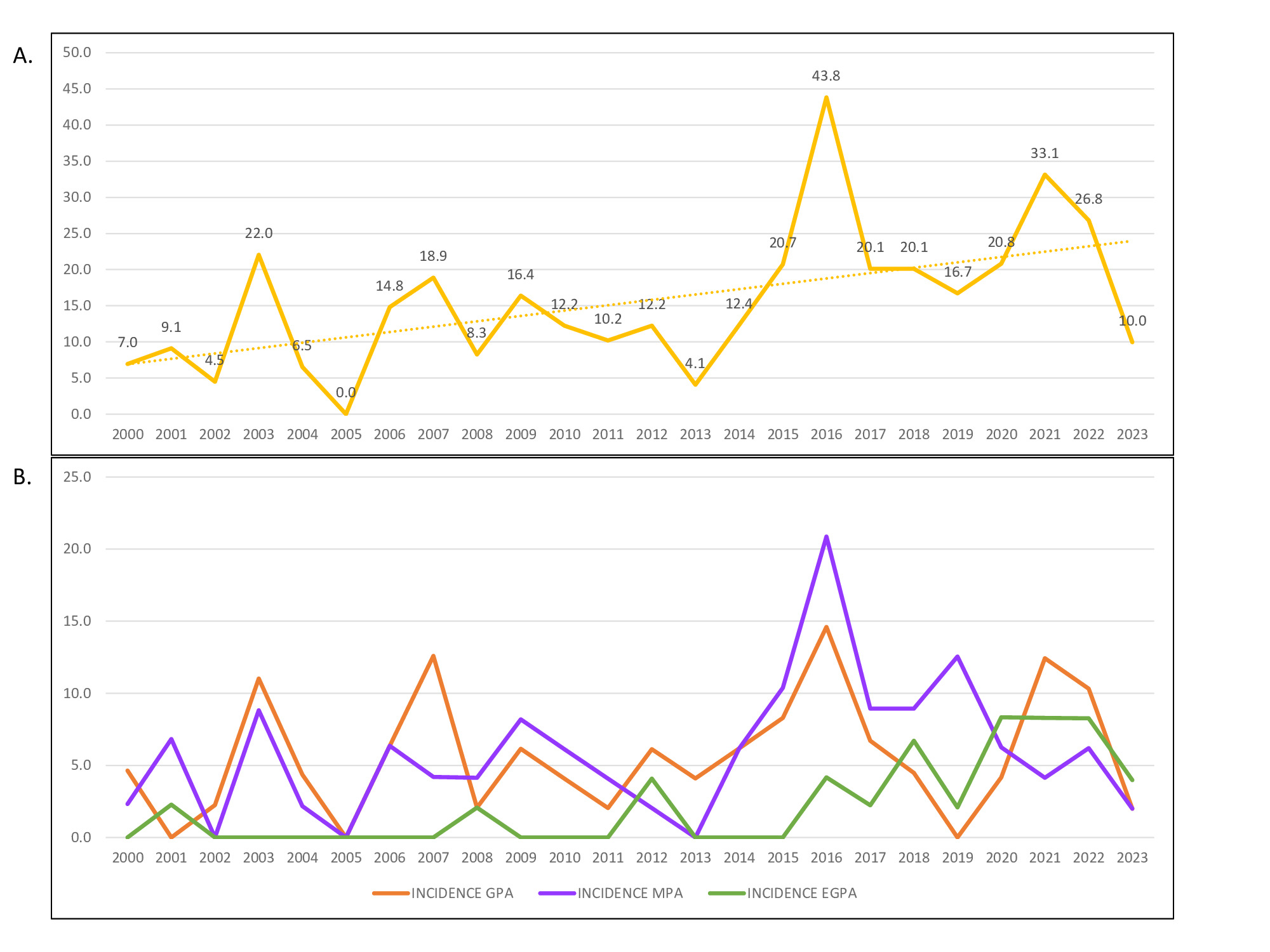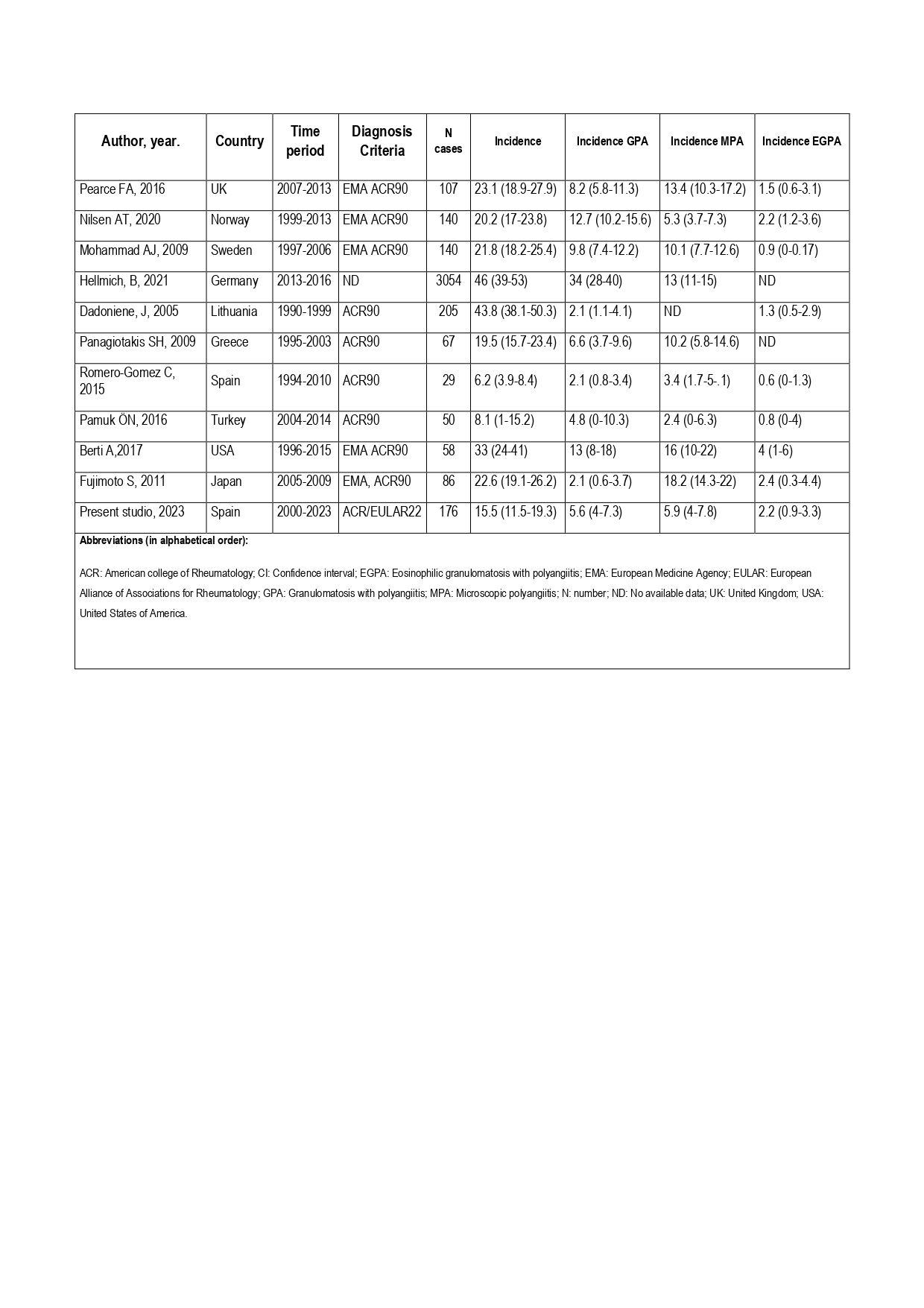Session Information
Session Type: Poster Session A
Session Time: 10:30AM-12:30PM
Background/Purpose: Anti-neutrophil cytoplasmic antibodies (ANCA) associated vasculitis (AAV) is a group of vasculitis that affect small vessels. Includes Granulomatosis with polyangiitis (GPA), Eosinophilic granulomatosis with polyangiitis (EGPA) and Microscopic polyangiitis (MPA). Precise estimation of the incidence has been difficult due to the absence of reliable diagnosis criteria and studies with heterogeneous population.
Our aim was to estimate the incidence of AAV in a Northern Spanish region between 2000 and 2023. Compare our results with similar studies from other countries.
Methods: Population-based study of 176 patients diagnosed with small vessel vasculitis between January 1st of 2000 to December 31st of 2023. Selected from a data base from clinical reports provided from different departments (Immunology, Dermatology, Nephrology, Internal Medicine, Pneumology and Rheumatology). The diagnosis of AAV was according to ACR/EULAR 2022 criteria. Patients that did not meet criteria were classified as Indeterminate Vasculitis. Incidence was reported annually (on December 31st of every year) per 1,000,000 (106) habitants per year and the incidence by diagnosis was calculated. We searched similar studies from the available bibliography.
Results: A total of 176 (92 men/84 women) patients were included. The mean age at diagnosis was 69.5±13.6 years. The most frequent type of AAV was MPA with 67 (38.1%) followed by GPA, EGPA with 64 (36.4%) and 24 (13.6%) respectively. The Indeterminate group had 21 (11.9%) patients.
Annual incidence of AAV in Cantabria area between 2000-2023 period was 15.5 (95% IC: 11.5-19.3) per 106 habitants. The incidence in male and female were 16.6 (95% IC: 11.8-21.2) and 14.1 (95% IC: 10-18.1) per 106 habitants, respectively. The incidence by diagnosis were 5.6 (95% IC:4-7.3) for GPA, 5.9 (95%IC: 4-7.8) for MPA and 2.2 (95% IC:0.9-3.3) for EGPA. FIGURE. A comparison between different geographical areas showed wide variations in annual incidence. The highest annual incidence was observed in Nordic countries, The United States and Central Europe. The lowest results were in Southern Europe. TABLE
Conclusion: There seems to be a progressive increase in incidence of AAV over the years in the studied population. Annual incidence in our region was like others.
A. Annual incidence of AAV in 176 patients between 2000_2023 B. Annual incidence by diagnosis.
To cite this abstract in AMA style:
Benavides F, Herrero-Morant A, Al Fazazi S, Calvo-Rio V, Renuncio-García M, Martín-Gutiérrez A, Sánchez-López A, Poo-fernandez C, Escagedo-Cagigas C, Rodríguez-Vidriales M, Blanco-Alonso R. Incidence of ANCA-Associated Vasculitis in a Northern Spanish Health Region Between 2000-2023: A Populatio-based Study [abstract]. Arthritis Rheumatol. 2024; 76 (suppl 9). https://acrabstracts.org/abstract/incidence-of-anca-associated-vasculitis-in-a-northern-spanish-health-region-between-2000-2023-a-populatio-based-study/. Accessed .« Back to ACR Convergence 2024
ACR Meeting Abstracts - https://acrabstracts.org/abstract/incidence-of-anca-associated-vasculitis-in-a-northern-spanish-health-region-between-2000-2023-a-populatio-based-study/


